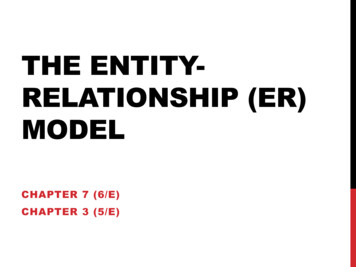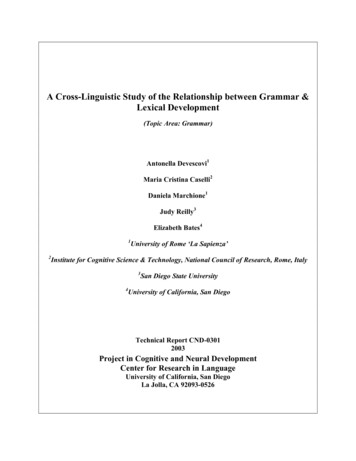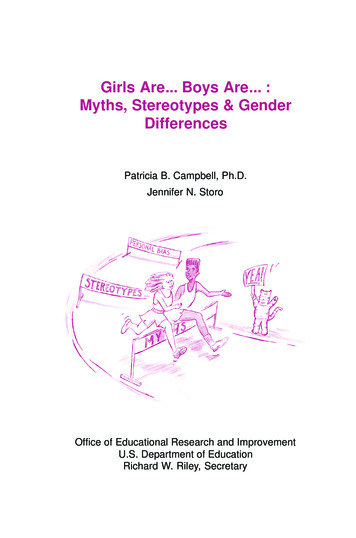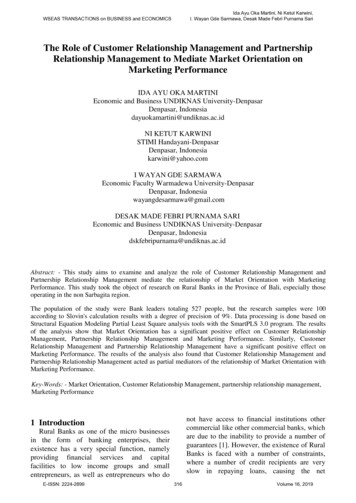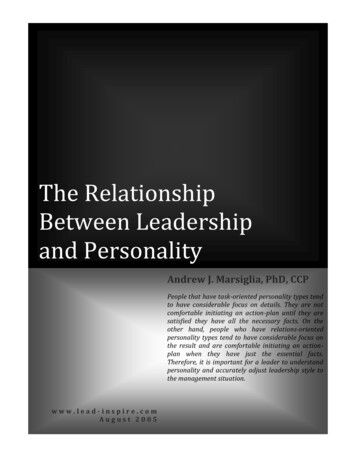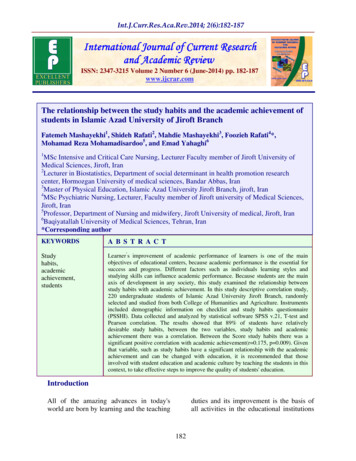
Transcription
ISSN: 2347-3215 Volume 2 Number 6 (June-2014) pp. 182-187www.ijcrar.comThe relationship between the study habits and the academic achievement ofstudents in Islamic Azad University of Jiroft BranchFatemeh Mashayekhi1, Shideh Rafati2, Mahdie Mashayekhi3, Foozieh Rafati4*,Mohamad Reza Mohamadisardoo5, and Emad Yahaghi61MSc Intensive and Critical Care Nursing, Lecturer Faculty member of Jiroft University ofMedical Sciences, Jiroft, Iran2Lecturer in Biostatistics, Department of social determinant in health promotion researchcenter, Hormozgan University of medical sciences, Bandar Abbas, Iran3Master of Physical Education, Islamic Azad University Jiroft Branch, jiroft, Iran4MSc Psychiatric Nursing, Lecturer, Faculty member of Jiroft university of Medical Sciences,Jiroft, Iran5Professor, Department of Nursing and midwifery, Jiroft University of medical, Jiroft, Iran6Baqiyatallah University of Medical Sciences, Tehran, Iran*Corresponding authorKEYWORDSA B S T R A C TStudyhabits,academicachievement,studentsLearner s improvement of academic performance of learners is one of the mainobjectives of educational centers, because academic performance is the essential forsuccess and progress. Different factors such as individuals learning styles andstudying skills can influence academic performance. Because students are the mainaxis of development in any society, this study examined the relationship betweenstudy habits with academic achievement. In this study descriptive correlation study,220 undergraduate students of Islamic Azad University Jiroft Branch, randomlyselected and studied from both College of Humanities and Agriculture. Instrumentsincluded demographic information on checklist and study habits questionnaire(PSSHI). Data collected and analyzed by statistical software SPSS v.21, T-test andPearson correlation. The results showed that 89% of students have relativelydesirable study habits, between the two variables, study habits and academicachievement there was a correlation. Between the Score study habits there was asignificant positive correlation with academic achievement(r 0.175, p 0.009). Giventhat variable, such as study habits have a significant relationship with the academicachievement and can be changed with education, it is recommended that thoseinvolved with student education and academic culture by teaching the students in thiscontext, to take effective steps to improve the quality of students' education.IntroductionAll of the amazing advances in today'sworld are born by learning and the teachingduties and its improvement is the basis ofall activities in the educational institutions182
. The credit of an educational systemdepends on the learning of its learners.Learning and academic performance isaffected by many factors, includingpersonality, IQ, family background, genderand age, as well as acquired factors such aslearning styles and methods of study wouldhave the effect.Materials and MethodsThis is a cross-sectional study (descriptiveanalytical) conducted in the first semesterof the year 92. The study population was allundergraduate students in Islamic AzadUniversity of Jiroft. Initially, two facultieswere chosen by systematic randomselection among all faculties (Humanities,Agriculture, Technology, and PhysicalEducation). Then three fields of studieswere randomly selected from each faculty,the fields of Judicial Studies, literature, andTheology from the faculty of Humanitiesand, the fields of Biology, Horticulture andAgriculture from the faculty of Agriculture.Then an entry was randomly selected andall incoming students were studied.Studies in the field of cognitive psychologyhave shown that learning and studystrategiesimprovestheacademicperformance. Stark found in his studythat participating in academic seminars onstudy skills improves the level of keepingscientific contents .In addition, numerous studies have shownthat the impairment in learning and studyskills could negatively be overshadowed byall the benefits of a good learningenvironment, even personal intellectualcapabilities and mental /physical health.On the other hand, in the case ofeffectiveness could adjust or compensatemany potential failures in an educationalsetting and shortcomings in academicmotivation and mental /physical health thatcan have a favorable impact on academicperformance. Since the students areconsidered as the intelligentsia, efficientand future-making levels in each countryand the youth are human capital and themain focus of development in anysociety , the improvement and thedevelopmentofstudentsacademicperformance is one of the main objectivesof training centers .1.Demographicinformationchecklist(academic major, gender, birth order,marital status, indigenous status, mother'seducation, father's education, and GPA inthe previous semester)2.Palsane Sharma Study Habit Inventory(PSSHI) which was designed in eightdimensions of Time management, Physicalcondition, Ability to read and note,Learning motivation, Memory Holdingexams, and health. Scoring system is basedon a Likert scale (0-4) in which Zero is thelowest score and 90 is the highest. Thehigher scores indicate the good habits ofstudy. The total scores of the reading habitsof three people are classified in threeclasses including the poor study habits (lessthan 30), Relatively Desirable (31 to 60)and desirable (more than 6). The reliabilityof the 88/65 split method of internalconsistency of 0/0 and the criterion-relatedvalidity of the 74/0 has been reported.This study is aimed to determine therelationship between the study habits andacademic achievement of students inIslamic Azad University of Jiroft Branch aseffective and efficient steps to improve thequality of education has been.Its Reliability, internal consistency bybisect method and Criterion-related validitywere reported 0.88, 0.65 and 0.74,183
respectively. In order to data analysis,statistical software SPSS v.21, t-test andPearson correlation coefficient wereapplied and (p 0.05) was chosen as thesignificance level.memory than male students (P 0.043, r 0.139). The t-Test analysis showed asignificant difference (P 0.00) betweenthe average score for males (14.92 1.72)and females (15.89 1.80). The t-Testanalysis showed no significant difference(P 0.739) between the average score forIndigenous students (15.26 1.86) and Nonindigenous students (15.37 1.59). Therewas an inverse correlation between thestudents' average and their age, as more ageleads to less average scores (P 0.002, r 0.206). There was found no correlationbetween the average and the field of study.There was a positive correlation betweenthe students' average and their father'seducation (P 0.013, r 0.168). There wasno correlation between the average andother demographic variables.Result and Discussion% of the students were female and62.7% male. 60.9% of the students weresingle and 39.1% were married. Thestudents' age ranged from 18 to 59 yearswith a mean age ofyears andstandard deviation of 8.18 years (18/8 35/26). The Average GPA of students was15.28 ranged from 11 to 19. The mean andstandard deviation of GPA scores, studyhabits and its areas are shown in table (1).In total, 23 students (4/10%) showed goodstudy habits, 196 students (89%) wererelatively desirable, and 1 student (6/0%)had poor study habits.The results showed that there is acorrelation between two variables of studyhabits and academic achievement, when thestudy habits scores increase, the academicachievement will also increase,as thestudents with study habits score above 60were achieved more average. Derossis andcolleagues also reported a significantcorrelation between the study habits and theacademic achievement of students. InthestudyconductedbySirohi,poor study habits were reported as one ofthe biggest causes of the poor academicperformance in the studied samples.Boehler and colleagues also found apositive and significant relationshipbetween the study habits and the academicachievement. It was reported that thestudents who note the important subjects intheir own words and sentences had betterperformance than those just mark theimportantsubjects,These findings are also in accordance withBoehler [12] FereidouniMoghadam [8] andKhadivzadeh [13].The results about the scores based on thedimensions of study habits include: Timemanagement 5.89 from 10, Physicalcondition 6.39 of 12, Ability to read 8.73 of16, Ability to note 7.37 of 6, Learningmotivation 7.88 of 12, Memory 4.40 of 8,Holding exams 10.18 of 18, and health 3,15of 6. Table 2 summarizes the relationshipof study habits and average withdemographic variables. According to thistable, there is a significant positivecorrelation between the total score of studyhabits and the average (P 0.009, r 0.175). It means that when the study habitsscore increases, the GPA will also increase.A correlation was found between the notingskill and the field of study which meansthat the noting skill is more used by thestudents of the faculty of Humanitiesduring the study (P 0.039, r 0.139).There was a correlation between thedimension of memory and gender, in thatfemale students had higher scores in184
Table.1 The average of GPA scores, study habits, and its area based on students of different majorsStudents' score and major theologyAverageStudy habitsTime managementPhysical conditionAbility to readAbility to noteLearning motivationMemoryHolding examsHealthliteratureJudicial Studies Biology, and Horticulture AgriculturtotalTable.2 The estimated correlation coefficient between GPA, study habits, and its areas with age,gender, parental education and the majorsThe examinformationAverage-Demographic AgegenderMaritalstatusMother'seducation,Study habitsTime managementPhysical conditionAbility to readAbility to noteLearning motivationMemoryHolding examsHealth0.01 p 0.05 p 185Father'seducationThe fieldstudyof Total
The study habits is undoubtedly one of thefactorsthatinfluenceacademicachievement; since those who have betterstudy skills have more active learning andare more involved in the educationalsubjects, therefore, will havebettermemorizing and remembering abilities.The average of the study habits scores ofstudents was 50.06 7.97. Based on theresults, the majority of students (89%) hadmoderate or moderately good study habits,means that the total score ranged from 6031. According to the importance of studyhabits in the learning process, this situationis not ideal. It seems that the students havenot achieved the necessary instructions toimprove their study skills and habits. Thissituation is observed not only in thestudents of Azad University, but also inother students of country, most of thestudents have moderately desirable studyhabits.of female students is more than malestudents, which is in accordance with thefindings of Rafati et al in the nurserystudents of Shiraz.Durack hold an educational course of studyhabits for students and found its positiveeffect on learning and doing the students'homework. In the study on thestudents' study habits grades in terms ofdemographic variables, it was found thatthere is not significant relationship betweenthe study habits scores and the variables(age, marital status, indigenous status,birth, parents education). A correlation wasonly observed between the memorydimension of study habits and the students'gender. The memory was more used byfemale students during the study. Therewas also a correlation between the field ofstudy and the noting dimension. The notingskill was more used by the students of theFaculty of Humanities during the study. Inthis study, there was found no correlationbetween the age and the study habits scoresthat was in accordance with the findings ofFereidouniMoghadam. Comparing thestudents' average showed that the averageAcknowledgementConclusionSince the study habits has a significanteffect on academic achievements andaccording to the importance of study habitson academic performance and educationalprogress that finally effect on academic andcareer future, so it is essential to considerand planning to improve methods and studyhabits of students. According toresearchers, the people's study habits areteachable and learnable and several stepscan be taken in this field. It is alsorecommended that the courses of correctstudy habits to be held for the students inthe entrance to the university to gain theknowledge in this field.The authors would like to thank theResearch Deputy of Medical University ofJiroft and also all students and authoritiesof Azad university of Jiroft, for their kindcontribution in the research.References1. Torshizi M VS, Poor Rezaei Z, Fasihi R.Study Habits in Students of BirjandUniversity of Medical Sciences. IranianJournal of Medical Education. 2013;12(13):866-762. Sirohi V. A study of underachievementin relation to study habits and attitudes. JInd Edu. 2004:1(9):14-93. Snelgrove S, Slater J. Approaches tolearning: Psychometric testing of a studyprocess questionnaire. Journal ofAdvanced Nursing. 2003; 43(5):496505186
4. Forrest S. Learning and teaching: thereciprocal link. Journal of continuingeducation in nursing. 2003; 35(2):74-95. Mohammadpour A, Matlabi M. Thesurvey of the Gonabad medical sciencesstudents views on their educational needsand improving theoritical and clinicaleducation program (2001-2002). IranianJournal of Medical Education. 2002;2:41-56.6. Starke MC. Retention, Bonding, andAcademic Achievement: Effectiveness ofthe College Seminar in PromotingCollege Success. 19947. Koushan M, Heydari A. Study habits instudents of Sabzevar School of MedicalSciences. Journal of Sabzevar School ofMedical Sciences. 2007; 13(4):185-98. FereidouniMoghadam M, Cheraghian B.Study Habits and Their Relationshipwith Academic Performance amongStudents of Abadan School of Nursing.Strides in Development of MedicalEducation. 2009;6(1).9. Tavakol M, Murphy R, Torabi S.Medical education in Iran: an explorationof some curriculum issues. Medicaleducation online. 2009; 11(7): 1-810.Bagherzadeh ladari R SM, HaghshenasM, Mousavi SE. Study of theRelationship Between Locus of Controland Academic Achievement AmongStudents of Mazandaran University ofMedicalSciences.JournalofMazandaran University of MedicalSciences. 2010; 20(77):30-511.Derossis AM, Da Rosa D, Schwartz A,Hauge LS, Bordage G. Study habits ofsurgery residents and performance onAmerican Board of Surgery In-Trainingexaminations. The American journal ofsurgery. 2004;188(3):230-612.Boehler ML, Schwind CJ, Folse R,Dunnington G, Markwell S, Dutta S. Anevaluation of study habits of third-yearmedical students in a surgical clerkship.The American journal of surgery. 2001;181(3):268-7113.Khadivzadeh T, Seif AA, Valayi N. Therelationship of students study strategieswith their personal characteristics andacademic background. Iranian Journal ofMedical Education. 2004; 4(2): 53-6114.Durak H, Törün S, Sayiner A,KandilogluG.Descriptionandevaluation of an innovative course onlearning and study skills for the first yearmedical students. Tohoku journal ofexperimentalmedicine.2006;210(3):231-715.Rafati F, Sharif FZeyghami sionextroversion and neuroticism of nursingstudents in Shiraz. The Journal of QazvinUniversity of Medical Sciences. 2004;30(12):0187
achievement there was a correlation. Between the Score study habits there was a significant positive correlation with academic achievement(r 0.175, p 0.009). Given that variable, such as study habits have a significant relationship with the academic achievement and ca



